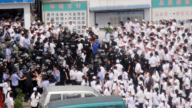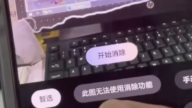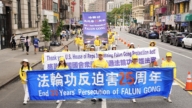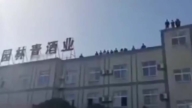【新唐人2009年11月17日讯】欧巴马关于twitter和gfw的录音(中英文)
欧巴马:
好吧,我现在请我的洪大使,现在有一个网民通过我们使馆网站提了一个问题。
[洪博培]
第一,有这么多互联网使用者的国家,有6000万写博客的人,你知道防火墙的事情吗?第二,我们是不是应该自由的使用TWITTER?
欧巴马:
首先让我说,我从来没有使用过TWITTER。我注意到一些年轻人,他们一直很忙,有各种各样的电子器材,很笨重。但是我还是非常相信技术的作用,非常重视开放性。在信息流动方面,我认为越是能够自由的信息流通,社会就变得越强,因为这样子,世界各地的公民能让自己的政府负责,有一个问责制度,他们自己会思考,这样会有新的想法,鼓励创造性。所以我一直是坚定的支持互联网开放的使用,我是非常支持不审查内容,在美国我过去谈过,这是我们的一个传统,我也认识到不同的国家有不同的传统,但是我可以告诉各位,在美国,我们有没有受限制的使用互联网的机会,这是我们力量的来源,也应该受到鼓励的。
但是我也应该很诚实的告诉各位,作为美国总统,有的时候我还是希望信息不是那么自由的流通,因为这样我就不需要听到人们在批评我,我认为很自然的。
在人处于一个实力地位的时候就会想到,你为什么这样说我,你这样说是很不负责的。可是真实的情况是这样,因为在美国信息是自由的,因为在美国有很多人批评我说各种各样的事情,但我还是认为,这样才会使得我们的民族制度变得更强,使我变成一个更好的领导人,因为它迫使我听到一些我不愿意听到的意见,也迫使我审查我正在做的事情,每天都要审查,要看我是不是真的为美国人民做我能做的最好的事情。所以我认为互联网现在已经变成一个更强的工具,可以让公民来参与。
实际上,我这次胜选,当了总统的一个原因之一我们能够动员很多年轻人,通过互联网来动员。刚开始的时候,没有人会想到我会赢,因为我们不是得到最富裕的支持者、政治上最有权利的人支持我们,可是人们通过互联网看到我们竞选,他们开始感到很兴奋,他们就组织起来成立一些竞选的活动、事件和集会,结果就产生了这些从下往上的一种行动,使我们很成功。
这不仅在政府和政治,在企业界一样。像Google这种公司,不到20年前,它只是两个年龄跟你们差不多一样的人创业,本来是科学的实验,后来因为互联网,他们能够创造一个产业,这个产业使得全世界各地的商业发生一场革命。
所以要不是有很自由的开放性,就像互联网所提供的开放性,那Google不会存在,所以我很支持一个做法,就是不要限制互联网的使用、接触或者像 TWITTER这种信息技术,越开放越能够沟通,使全世界联系在一起。像我的两个女儿玛丽亚和娜塔莎,一个是11岁,一个是8岁,在她们的房间可以上网,通过互联网可以达到世界任何地方,可以学到她们想学的内容,这是她们巨大的力量,她们拥有这种力量,也有利于促进相互理解。
就像我刚才所说的,技术也有负面,恐怖份子也可以通过互联网做一些以前他们做不到的事情,有一些极端分子也可以动员。当然开放性肯定要付出某种代价,这是不能否认的。可是我想好的远远多于坏的,所以还是要保持开放是好的,这是我很高兴互联网也作为这个论坛的一部分。最后两个问题。
PRESIDENT OBAMA:
Okay. All right? Jon — I’m going to call on my Ambassador because I think he has a question that was generated through the Web site of our embassy. This was selected, though, by I think one of the members of our U.S. press corps so that —
AMBASSADOR HUNTSMAN: That’s right. And not surprisingly, “in a country with 350 million Internet users and 60 million bloggers, do you know of the firewall?" And second, “should we be able to use Twitter freely" — is the question.
PRESIDENT OBAMA: Well, first of all, let me say that I have never used Twitter. I noticed that young people — they’re very busy with all these electronics. My thumbs are too clumsy to type in things on the phone. But I am a big believer in technology and I’m a big believer in openness when it comes to the flow of information. I think that the more freely information flows, the stronger the society becomes, because then citizens of countries around the world can hold their own governments accountable. They can begin to think for themselves. That generates new ideas. It encourages creativity.
And so I’ve always been a strong supporter of open Internet use. I’m a big supporter of non-censorship. This is part of the tradition of the United States that I discussed before, and I recognize that different countries have different traditions. I can tell you that in the United States, the fact that we have free Internet — or unrestricted Internet access is a source of strength, and I think should be encouraged.
Now, I should tell you, I should be honest, as President of the United States, there are times where I wish information didn’t flow so freely because then I wouldn’t have to listen to people criticizing me all the time. I think people naturally are — when they’re in positions of power sometimes thinks, oh, how could that person say that about me, or that’s irresponsible, or — but the truth is that because in the United States information is free, and I have a lot of critics in the United States who can say all kinds of things about me, I actually think that that makes our democracy stronger and it makes me a better leader because it forces me to hear opinions that I don’t want to hear. It forces me to examine what I’m doing on a day-to-day basis to see, am I really doing the very best that I could be doing for the people of the United States.
And I think the Internet has become an even more powerful tool for that kind of citizen participation. In fact, one of the reasons that I won the presidency was because we were able to mobilize young people like yourself to get involved through the Internet. Initially, nobody thought we could win because we didn’t have necessarily the most wealthy supporters; we didn’t have the most powerful political brokers. But through the Internet, people became excited about our campaign and they started to organize and meet and set up campaign activities and events and rallies. And it really ended up creating the kind of bottom-up movement that allowed us to do very well.
Now, that’s not just true in — for government and politics. It’s also true for business. You think about a company like Google that only 20 years ago was — less than 20 years ago was the idea of a couple of people not much older than you. It was a science project. And suddenly because of the Internet, they were able to create an industry that has revolutionized commerce all around the world. So if it had not been for the freedom and the openness that the Internet allows, Google wouldn’t exist.
So I’m a big supporter of not restricting Internet use, Internet access, other information technologies like Twitter. The more open we are, the more we can communicate. And it also helps to draw the world together.
Think about — when I think about my daughters, Malia and Sasha — one is 11, one is 8 — from their room, they can get on the Internet and they can travel to Shanghai. They can go anyplace in the world and they can learn about anything they want to learn about. And that’s just an enormous power that they have. And that helps, I think, promote the kind of understanding that we talked about.
Now, as I said before, there’s always a downside to technology. It also means that terrorists are able to organize on the Internet in ways that they might not have been able to do before. Extremists can mobilize. And so there’s some price that you pay for openness, there’s no denying that. But I think that the good outweighs the bad so much that it’s better to maintain that openness. And that’s part of why I’m so glad that the Internet was part of this forum. Okay?
I’m going to take two more questions. And the next one is from a gentleman, I think. Right here, yes. Here’s the microphone.






























